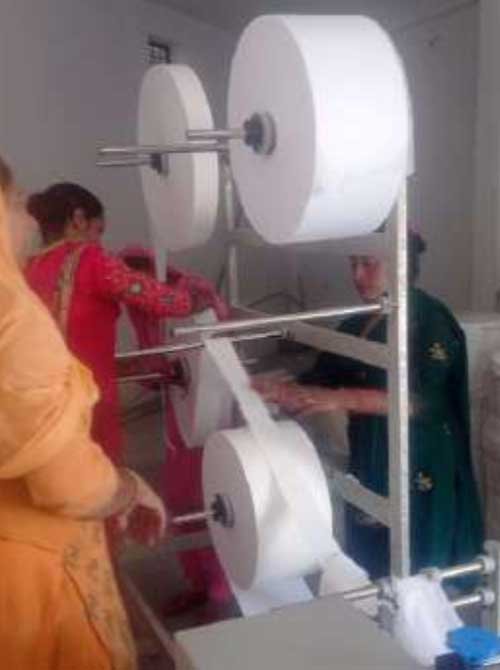
RURAL TRANSFORMATION THROUGH SELF HELP GROUPS
1
2
3
WORKSHOPS FOR RURAL ARTISANS AND SELF HELP GROUPS
A notable aspect about rural artisans is that they belong to the unorganized sector. These artisans on one hand are regarded as custodians of the heritage of India and on the other hand are deprived of all the modern facilities and financial assistance. This sector can contribute a lot by providing employment opportunities and generation of rural income. The handcraft sector forms the second largest unorganized employment sector in India, second only to agriculture. In India craft can be described not merely an industry but a creation symbolizing the inner desire and fulfilment of the community. At present there are nearly 23 million handcraft people in India.
Art-craft serves as an alternate source of income for the agricultural workers. The handicrafts provide a major source of livelihood throughout rural India. In nonagricultural or lean seasons, handicrafts become an alternative means of subsistence for the rural population and safeguards them from food insecurity.
Each art form too has its own cultural significance and history. But gradually, these crafts are dying out with increased modernization. In this fast technology run world, interest of consumers has shifted from the traditional handicrafts and handloom to new innovations. The artisans also face various financial and logistic challenges to find buyers and get the right price for their products. Their education level is low and their linkages with rural developmental institutions are nonexistent. Most of the technologies remain confined to R&D institutions. Their weak communication power and tendency to remain “small” and “satisfied” are some of the other problems.
The traditional arts of Himachal too are slowly disappearing. Artisans face challenges like finance, upskilling, marketing, social barriers and even domestic issues.
It becomes imperative that our ancient arts are not allowed to die and the skilled hands are made self –sufficient. We organized a session for the Artisans and Self Help Groups of Hamirpur, Himachal in Purli Gram Panchayat. The session was piloted by Ms. Neeta Jadav, chief coordinator, Gramshree; organization providing livelihood to more than 500 women. Encouraging the women, she gave a vision to the artisans and SHG members to build their own brand and get recognized for their skills. Moving ahead, we would handhold these artisans and pledge to make their stories and their products known.
We also organized a session on financial literacy, inviting Mr. Pratik Suthar from IIM Ahmedabad for guiding the artisan and women groups. He inspired them to explore innovative and modern means to operate. Case studies of successful women entrepreneur groups from Gujarat were also discussed and they were motivated to upskill themselves as per the interest of modern day customer. Usually, the artisans have little market intelligence relating to their products. The workshop involved a sincere discussion about effectively placing the products to the right customer in the right manner with a customer centric approach. The attendees showed keen interest and raised questions with regards to Government schemes, banking system, marketing channels etc. The resource-poor artisans cannot afford skill up gradation at the cost of their livelihood earning. Through interactions with these artisans, their felt-needs and insights have been recorded.
MICRO-ENTERPRISE: SANITARY PAD PRODUCTION
1
2
The 100% Biodegradable Sanitary Pad Production Unit set up under the able guidance and leadership of Hon’ble Union Minister Sh. Anurag Singh Thakur in his Parliamentary Constituency, Hamirpur has become the cornerstone of women empowerment and women health. The unit has provided a source of regular income to a group of 5 women in Narsin Panchayat where the unit has been set-up.
The location of the production unit within the panchayat has also effectively addressed the taboo around menstruation & the empowered group is now taking the message of menstrual hygiene to every household. The production unit is slowly emerging as the Nari-Shakti Kendra and is being utilized as a platform to transform the lives of women in the region.
The unit is being operated & managed by an all-women team who are taking care of the production, packaging, stock-keeping , maintenance and even marketing of the product.
As of now, the group is doing efforts to spread awareness around menstrual health, usage of sanitary napkins and also putting forward the idea of environment cleanliness by shifting to biodegradable sanitary napkins.
To bring more women onto the bandwagon, the sanitary napkin packets are being distributed for free so as to create awareness about the environment-friendly alternative being produced locally.
All the relevant stakeholders like district administration & police, mahila mandals, government schools, health workers, panchayat representatives, community volunteers and social media influencers have joined the movement and sensitisation is being done through free distribution as well as seminars on menstrual hygiene.

IMPACT
SOCIAL
ECONOMIC
- Affordability of Sanitary Pads.
- Livelihood support for the women at local level (Monthly Assured Income of 6,000 per women).
- Additional income generation over and above farming & other traditional chores.
- Builds up the scope for employment and profit through direct/in-direct linkages.
ENVIRONMENT
- Availability of environment friendly wellness product.
- Convenient for the women to utilize their natural surroundings to dispose used
products.
ADVANCED TRAINING FOR CROCHET ARTISANS
Craft sector plays a major role in socio-economic empowerment of women. A 5 day advanced course was offered to a group of crochet artisans in district Hamirpur with the objective of utilizing the potential of craft and craftsmen of Himachal Pradesh. For this, we invited expert trainers from, ‘Step by Step’, a nonprofit working to uplift rural artisans.
The training was divided into three modules:
1. Product creation – Design innovation & Cost Management
2. Product Marketing – Marketing & Sales, Personality Development,
Law & Entrepreneurship
3. Product Branding – Photography & Packaging
Post the training, the artisans are being provided free raw material and are being supported to obtain work orders. Some of the pictures of their products post training:
To publicize their work within the region, we self-procured some of their products like soft toys and distributed it as prizes to the students of our EK Se Sreshtha Program.
Most Importantly, this artisan group got the attention of Sh. Anurag Singh Thakur, Hon’ble Former Union Minister & Member of Parliament, Hamirpur and received his appreciation when we helped the group make crochet gift boxes and presented it to the dignitaries on significant occasions. The groups are also being guided on creating products for corporate gifting.


Mahila Pahari Sangeet Pratiyogita
1
2
Traditional culture serves as the bedrock of a society, embodying its history, values, and identity. In the modern era, where globalization and technological advancements are rapidly changing the cultural landscape, it becomes crucial to preserve and promote traditional values. Additionally, recognizing and providing a platform for women within these cultural frameworks is an essential step towards fostering women empowerment.
Historically, women have played integral roles in preserving and perpetuating cultural traditions, serving as custodians of heritage and guardians of familial values.
Mahila Pahari Sangeet Pratiyogita stands as a testament to the recognition of women’s contributions in preserving our rich cultural heritage. It provides a platform for women to showcase their talents and leadership across various realms.
The programme witnessed participation from over 17,000 women, demonstrating the vibrant tapestry of traditional culture and values. Participants, spanning various age groups, have made the Mahila Pahari Sangeet Pratiyogita a transformative endeavour, enriching the community and paving the way for a more inclusive and equitable future, while preserving and promoting the traditional & cultural values.
This initiative marked the beginning of a new chapter, aimed at embracing the richness of tradition and harnessing its potential for women’s empowerment. By staying rooted in timeless wisdom and cultural heritage, while navigating the complexities of the modern era, we strive towards a more harmonious and enlightened society.
